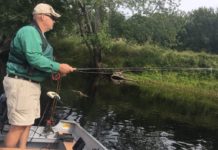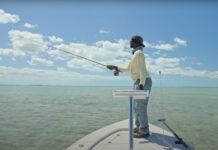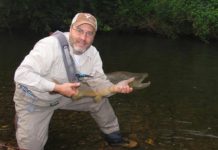“At 10 cfs— cubic feet per second — that’s a 95% reduction of where we are at today, around 200 cfs,” said angler Yancy Lind. “At 10 cfs in mid-August, this could be a complete eco system collapse. The water level will be extremely low. August is typically a very hot month. Temperatures would go up.”
Recent electro fishing and net sample surveys found about 2,000 red side rainbow trout per mile in the 10 miles of tailwater below Bowman Dam.
There are about three times that many whitefish in the same stretch.
Neither species will fare well if flows drop as predicted and water temperatures rise as expected.
“If we have air temperatures of 85, 90 degrees in August and the flows are at 10 cfs, the water temperature could easily get to the 80s. Above 70 degrees we get into the lethal range for red band trout.”
RELATED: The Great Outdoors: Sturgeon fishing on the Columbia River
RELATED: New study says decrease in salmon threatens killer whales
With Prineville Reservoir draining rapidly, disaster appears imminent for one of Central Oregon’s most-loved fisheries.
“It’s not as though there will be 100% death of all the fish, but anything over a very small fish is likely to die. There might be some small pools left where there’s very small fry and juvenile fish left. It looks really ugly,” Lind said.
“Some have called it a 1,200-year drought, a mega drought, but regardless our patrons are seeing a significantly reduced allocation,” said Bruce Scanlon, Ochoco Irrigation District Manager.
The Ochoco Irrigation District delivers water to 20,000 acres of irrigated farmland in the Prineville area.
Agriculture is a lynchpin of the area’s economy.
This year, area farmers received 25% of their usual water supplies. That means they are growing less crops, raising fewer cattle and making less money during a time of increased costs.
“When the drought progresses to this point, it’s challenging for everybody,” Scanlon said. “I’m a fly fisherman. I want to go out on the river and do certain things. I know it’s going to impact fishing. I know it’s going to impact wildlife. I also know people who graze animals. It’s a real challenge to do the things that embody the way of life we have here in Prineville when there’s no water to do it. It’s really magnified the importance of good water management, of conservation and being good stewards.”
“There isn’t enough water to meet the irrigation demands. The Ochoco Irrigation District has made the decision to release the water in a normal way until the middle of August when they’ll shut it down. At that point, Bureau of Reclamation says they’ll only have 10 cfs coming out. That’s their legal right. The question is, is it a moral thing to do?” Lind asked.
In anticipation of the shortened irrigation season, Oregon Department of Fish and Wildlife staff are monitoring flow and water quality conditions in the Crooked River downstream of Bowman Dam.
The Crooked River is a fun fishery for novice and expert anglers alike. If the ecosystem collapses, it could take years for it to recover.
“A decent size rainbow trout, the size you and I would like to catch, is three years old,” Lind said. “You have to have enough time for the system to recover, for the plants to recover, for the aquatic insects to recover and for the fish to grow. It could take quite some time and that assumes we have many good years, many wet years in the winter going forward.”
Low flows are impacting efforts to restore runs of salmon and steelhead above Lake Billy Chinook.
Until flows in the Crooked River increase, Portland General Electric is shifting releases of chinook and steelhead smolts to the Deschutes and Metolius rivers.
In the meantime, people are already wading knee deep across the Crooked River near Prineville.
Enjoy the Crooked River while there’s some water in it because, if the drought persists, the river could soon be a trickle of its former self.
Credit: Source link































